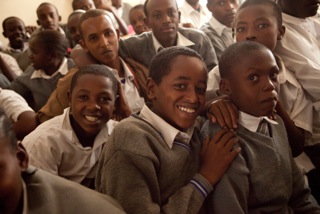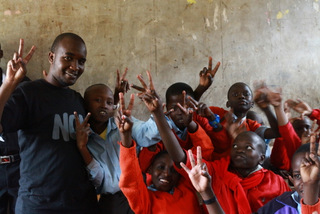Notice of West building lobby closure at Lucile Packard Children’s Hospital Stanford
In Kenya, Program Changes Male Attitudes About Sexual Violence, Study Finds
Young men and teenage boys participating in a program developed by No Means No Worldwide had more positive views toward women and less belief in rape myths, a study found.
For Release: June 9, 2015

Duthie Photography
Boys in Nairobi, Kenya, participate in an educational program designed by the nonprofit No Means No Worldwide to help them reevaluate their attitudes about violence against women.
In Kenya, where rape and violence against women are rampant, a short educational program produced lasting improvements in teenage boys’ and young men’s attitudes toward women, a study from the Stanford University School of Medicine has found.
The boys and men in the study also were more likely to try to halt violence against women after participating in the program.
The study was published online June 9 in the Journal of Interpersonal Violence.
The program was developed by No Means No Worldwide, a nonprofit, nongovernmental organization that works in the slums of Nairobi to prevent sexual assault on girls and women. Prior Stanford studies have shown that the group’s empowerment training for adolescent girls produces large reductions in the rate at which these girls are raped. The curriculum for males aimed to change attitudes that lead adolescent boys and young men to think it is acceptable to assault or rape their female peers.
“The curriculum for these young men is centered on getting them to think about what kind of people they want to be,” said lead author Jennifer Keller, PhD, clinical associate professor of psychiatry and behavioral sciences. “It’s about really getting them invested in why they need to step up and care about violence toward women: It affects their mothers, sisters and girlfriends.”
Understanding consent
 The study included 1,543 males, ages 15-22, who were from Nairobi slums. At 29 high schools, 1,250 of them received six two-hour educational sessions from No Means No Worldwide. The intervention curriculum, called “Your Moment of Truth,” focused on helping them recognize the cultural normalization of violence against women, and gain skills and courage to stop it. Topics of discussion included myths about women, negative gender stereotypes, when and how to safely intervene if you see someone else acting violently toward a woman, and what constitutes consent to sexual activity.
The study included 1,543 males, ages 15-22, who were from Nairobi slums. At 29 high schools, 1,250 of them received six two-hour educational sessions from No Means No Worldwide. The intervention curriculum, called “Your Moment of Truth,” focused on helping them recognize the cultural normalization of violence against women, and gain skills and courage to stop it. Topics of discussion included myths about women, negative gender stereotypes, when and how to safely intervene if you see someone else acting violently toward a woman, and what constitutes consent to sexual activity.
“If you think that when you take a woman out to dinner, she owes you something, you may believe that consent is different than it actually is,” Keller said. “The instructors and young men talked about understanding what true consent is and how to get that consent.”
The comparison group of 293 boys and men at seven other high schools received Kenya’s usual two-hour life-skills class.
The researchers used anonymous surveys to ask the participants in both the experimental and control groups about their attitudes toward women; their endorsement of rape myths; whether they had witnessed verbal harassment, physical threats or physical or sexual assault of women; and whether they had successfully intervened to stop such harassment, threats or assault. The boys and men in the experimental group completed surveys before the educational program began, immediately after it ended, and 4½ and nine months later. The participants in the comparison group completed surveys before receiving life-skills training and nine months later.
At the start of the study, participants in both groups reported negative views of women and agreement with myths about sexual assault, although the views of the control group were slightly better than those of the experimental group, possibly because they were slightly younger. After the classes, the experimental group had more positive views toward women and less belief in rape myths, and the improvement persisted 4½ and nine months later. The comparison group had unimproved or worsened attitudes toward women at the nine-month follow-up.
Making an impact
Similar numbers of participants in both groups witnessed verbal harassment and physical or sexual violence against women, but those in the experimental group were at least twice as likely as those in the comparison group to successfully halt such assaults. Within the experimental group, participants with the most positive attitudes toward women were the most likely to step in.
“It’s very exciting that this was done in Kenya, that even in this setting with high levels of violence toward women we were able to make such an impact,” Keller said.
Future studies will examine how boys’ and young men’s attitudes relate to their behavior in their own relationships, she said. “It’s harder to do,” Keller said, noting that research participants may not always admit, even anonymously, that they have behaved violently toward a girlfriend.
The study’s success with a relatively young group of males dovetails with prior research showing that it is easier to change negative gender stereotypes in younger groups, she added. In the United States, efforts to improve young men’s attitudes often occur in college, but earlier intervention might work better, Keller said.
Other Stanford co-authors of the study are Neville Golden, MD, professor of pediatrics and chief of the Division of Adolescent Medicine at Lucile Packard Children’s Hospital Stanford; and Cynthia Kapphahn, MD, professor of pediatrics and an adolescent medicine specialist at Lucile Packard Children’s Hospital Stanford. Other collaborators included Jake Sinclair, MD, and Lee Paiva, co-founders of No Means No Worldwide; and collaborators at United States International University, in Nairobi; at the nonprofit NGO Ujamaa-Africa; and at Edgework Consulting in Boston. The study was funded by Ujamaa-Africa.
Information about Stanford’s Department of Pediatrics, which also supported the work, is available at http://pediatrics.stanford.edu.
Authors
Erin Digitale
(650) 724-9175
digitale@stanford.edu
About Stanford Medicine Children's Health
Stanford Medicine Children’s Health, with Lucile Packard Children’s Hospital Stanford at its center, is the Bay Area’s largest health care system exclusively dedicated to children and expectant mothers. Our network of care includes more than 65 locations across Northern California and more than 85 locations in the U.S. Western region. Along with Stanford Health Care and the Stanford School of Medicine, we are part of Stanford Medicine, an ecosystem harnessing the potential of biomedicine through collaborative research, education, and clinical care to improve health outcomes around the world. We are a nonprofit organization committed to supporting the community through meaningful outreach programs and services and providing necessary medical care to families, regardless of their ability to pay. Discover more at stanfordchildrens.org.
About Stanford University School of Medicine
The Stanford University School of Medicine consistently ranks among the nation’s top medical schools, integrating research, medical education, patient care and community service. For more news about the school, please visit med.stanford.edu/school. The medical school is part of Stanford Medicine, which includes Stanford Health Care and Stanford Medicine Children’s Health. For information about all three, please visit med.stanford.edu.
Connect with us:
Download our App: